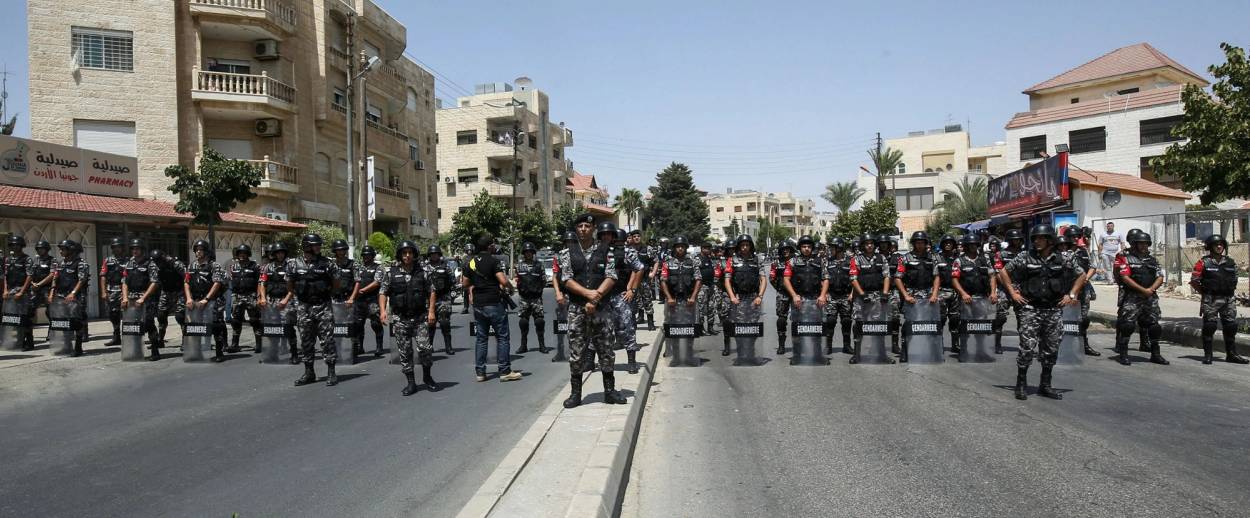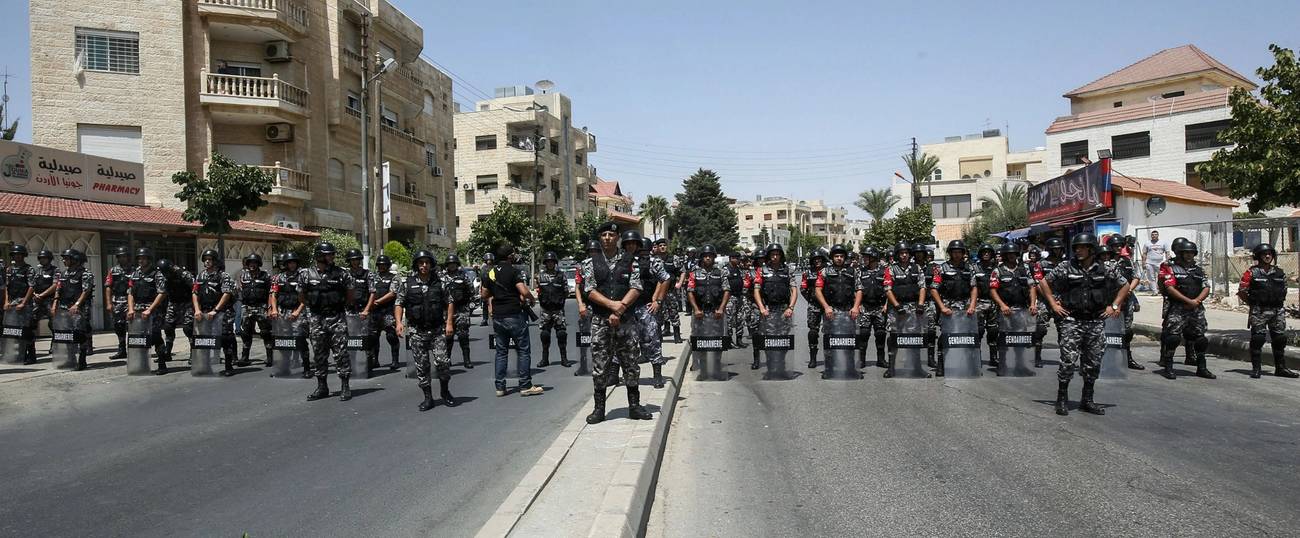A Killing in Amman Portends More Animosity Between Israel and Jordan
What began as a delivery of bedroom furniture may end up as a major diplomatic crisis




Details of what happened at the Israeli embassy in Amman, Jordan last month remain in dispute. While Israeli and Jordanian media have been filled with competing accounts of why an Israeli embassy security guard shot and killed two Jordanians—one of them a Christian relative of an influential Jordanian parliamentarian—they agree on this: the attack, interwoven with tensions over Israeli security measures in the wake of an earlier terrorist attack on the Temple Mount in Jerusalem, have triggered a crisis in relations between Israel and one of its closest Arab allies.
The drama began at 4 p.m. on a sweltering afternoon on July 23rd, when two Jordanians, one of whom owned the building which houses the Israeli embassy in the wealthy Rabia district of the Jordanian capital, entered the embassy compound to deliver bedroom furniture. At 6:30 p.m., an argument ensued—over what has not been disclosed. But Ziv Moyal, 28, a security guard at the embassy, shot and killed Mohammed Jawawdeh, a 17-year old Jordanian carpenter of Palestinian origin, after Jawawdeh attacked him with a screwdriver. Bashar Hamarneh, the doctor who owned the building and had tried separating the two men, was hit by a stray bullet and died as well.
Israel, citing diplomatic immunity, refused Jordan’s demands to turn over Moyal for questioning by Jordanian authorities. And while Israeli censors prevented the Israeli media from disclosing any details about the incident for over a day, Jordanians security forces surrounded the embassy compound and refused to permit the security guard, Ambassador Einat Shlein, or her staff to leave the building.
Meanwhile, President Donald Trump asked son-in-law and designated Middle East negotiator-in-chief Jared Kushner and lawyer Jason Greenblatt to help restore calm. When King Abdullah II initially refused to take Prime Minister Benjamin Netanyahu’s telephone call, Mr. Greenblatt, who had traveled to the region, spoke to the king and other senior officials in a flurry of calls. He diplomatically reminded the Jordanians that the Vienna Convention of 1961 protects the status of diplomats, including security guards. He also reminded Mr. Netanyahu that King Abdullah was furious about Israel’s decision to install cameras and metal detectors at the entrance to the Temple Mount after a terrorist attack there, a decision about which the king, who officially controls the holy sites on the Temple Mount—or the Haram al Sharif, the Nobel Sanctuary, as Muslims call it—was not consulted.
King Abdullah approved the departure of the Israeli embassy staff in Amman, including Moyal. Mr. Netanyahu agreed to remove the cameras and metal detectors he had installed on the Temple Mount. Senior Jordanian, American, and Israeli officials all insist that the two decisions were not linked and that the timing was purely “coincidental.” (Such fiction is not uncommon in Middle Eastern diplomacy, particularly in those rare instances when it succeeds.)
King Abdullah’s effort to detain Moyal and essentially hold Israeli diplomats hostage was an error that aggravated an already potentially explosive situation on the ground. Smadar Perry, the Arab affairs correspondent for Yediot Ahrahnot, who witnessed the political stand-off in Amman, said it was unclear during those tense hours whether the Jordanians would relent and release the diplomats.
She and others in Israel credit President Trump and his negotiators with helping ease the political tension. “Kushner’s and Greenblatt’s intervention was essential in calming the political waters,” she said.
The crisis might have ended with Moyal’s release had Prime Minister Netanyahu not further infuriated the king, and apparently most Jordanians, by giving the security guard a hero’s welcome upon his return, hugging him openly on national television. An enraged Abdullah, calling the welcome “unacceptable and provocative,” declared that there would be severe diplomatic consequences, some of which were quickly apparent.
On July 27th, Jordan’s Attorney General Akram Masaadeh charged Moyal in absentia with two counts of murder and for bearing an unlicensed weapon. Days later, the Jordanian media published the Israeli security guard’s name and a photo of his identity card, neither of which had previously been disclosed, forcing his family to flee their home in Israel. Jordanians officials also said that security cooperation with Israel would be suspended and that Israel’s diplomats would not be permitted to return until Moyal was brought to justice.
“This has been the worst crisis in Israeli-Jordanian relations in many years,” said Oded Eran, Israel’s ambassador to Jordan from 1997 to 2000.
And the crisis may not yet be over. Amman has now completed its own investigation of the incident. Security officials have interviewed the truck driver who delivered the furniture to the Israeli compound building and witnessed at least part of the fight. The fact that he has given no interviews to the press and has not been seen since then, presumably for his own protection, hints that Jordan may not be entirely pleased by his account.
Israel, too, has launched an its own official inquiry. Because most Israelis believe that Moyal’s killing of his attacker was an act of self-defense, if a panic-induced overreaction, the investigation is likely to drag on for some time. Israel may well offer to compensate the Hamarneh family for the landlord’s death. But Ambassador Eran said that the Netanyahu government erred yet again in failing to express immediate regret for the killing of an innocent bystander, particularly one who was a cousin of Mustafa Hamarneh, a Christian member of Jordan’s parliament who heretofore has been a staunch supporter of Arab-Israeli peace initiatives.
Underlying both the screwdriver incident and the Temple Mount protests, however, is King Abdullah’s intense and growing frustration with the lack of progress in solving the Palestinian-Israeli conflict. “The king has concluded that Netanyahu has no interest in resolving the conflict,” Eran said. Given the daunting challenges facing Jordan—an unemployment rate of over 30 percent among its overwhelmingly young population, its acceptance of 1.5 million Syrians as refugees from the ongoing civil war, and the economy’s meager growth—the perceived lack of progress on the peace front may have been the proverbial camel’s straw that helps explain why last week’s incidents were permitted to threaten a relationship upon which both nations depend.
Judith Miller, Tablet Magazine’s theater critic, is a former New York Times Cairo bureau chief and investigative reporter. She is also the author of the memoir The Story: A Reporter’s Journey.